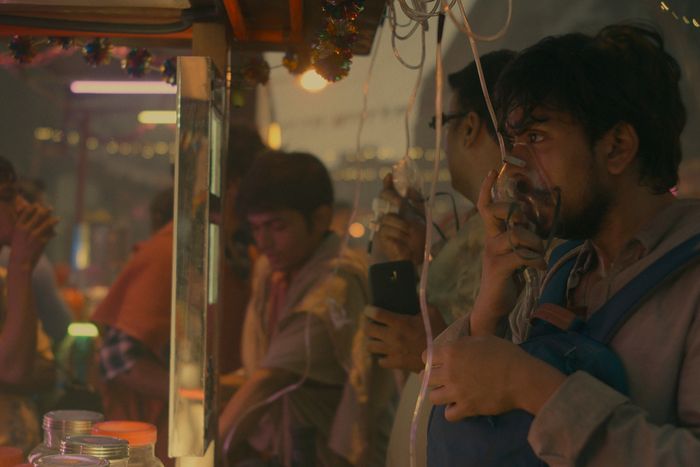
Extrapolations shouldn’t have been an easy watch, and the greatest failure of the recently concluded Apple TV+ series about the devastating worldwide effects of climate change is that it was. High-concept in its presentation of global warming’s impact on the future but small-minded in its commitment to rich Westerners as its primary protagonists, Extrapolations ended up being the kind of show you watch with a shrug instead of a gasp.
There’s an ugly cynicism to the series’ assumption that viewers will be most moved by the difficulty of getting fresh produce for a dinner party or hearing the world’s last humpback whale as voiced by Meryl Streep, rather than empathizing with people whose hardships are certainly greater. While actors like Matthew Rhys, Heather Graham, Judd Hirsch, Gemma Chan, Diane Lane, and Edward Norton portray the invariably well off, tens of millions of “climate refugees” are mentioned only in passing, and there is no meaningful discussion of what life is like in the regions of the world facing significant devastation: Africa, the Mediterranean, the Pacific Islands. The series’ only character who attempts climate-change reversal on a planetary scale is Indira Varma’s billionaire scientist, Gita Mishra, and Extrapolations not only calls her geo-engineering attempt terrorism, it makes her plan fail. The idea that extreme actions might be morally viable, and might be all we have left, isn’t something this series wants to give too much credence; it’s no How to Blow Up a Pipeline. Extrapolations would rather cling, fairly fecklessly, to legislation, prosecution, and good tech as our way out of this ever more drastic hole
Executive producer Michael Ellenberg said of the series’ star-studded cast, “We wanted to collapse the distance from this issue, and with these famous actors you’re there automatically.” Yet none of these famous actors plays someone in the midst of the kind of climate-caused struggle that so many around the world are already living through; they’re playing executives and high-powered lawyers, tech investors and art dealers, social-media influencers and real-estate developers. Only once in its eight episodes does Extrapolations deliver the emotional tension, breakneck pace, and knotty ethics required of a story that is meant to shake viewers out of complacency, and it’s in the episode with the fewest actors recognizable to an American audience.
Episode five, “2059 Part II: Nightbirds,” suggests the kind of vital series Extrapolations could have been if it had readjusted its barometer for whose struggles and sacrifices have narrative value. The preceding four episodes sketched a near-future in which Nicholas Bilton’s (Kit Harington) Alpha Industries holds a monopoly grip on tech, operating everything from a company that clones extinct animals to mines for base metals that are used in batteries, and his outsize influence has made it difficult for the countries where he does business to agree on how to address climate change. As the world gets warmer, nearly everything is corporatized and commodified, and “Nightbirds” provides the clearest look at what the increasing costs of staying alive in a crumbling world mean for people not working for one of Bilton’s companies or a federal government, not bestowed with inherited wealth, and not living in the United States.
The episode starts a few minutes before the end of the preceding episode, “2059: Face of God,” in which Mishra, flying a plane full of calcium carbonate that is meant to blot out the sun and cool the Earth (like what actually happened after the 2001 explosion of Mount Pinatubo), is shot down by Bilton and the American president near her hometown of Badlapur, India. Fifty-two kilometers away in Mumbai, driver Gaurav (Adarsh Gourav) watches the explosion through a hazy night sky. Mumbai is under a daytime curfew because of the heat, vendors sell oxygen masks by the puff, and there’s no real rice to be found in India because agricultural conditions are so poor; it’s all “synthetic, processed crap.” To make ends meet, former farmer Gaurav now transports illegal cargo. But there’s clearly something different about the job given to him by handler Neel (Gaz Choudhry), who insists on accompanying him on the drive to Varanasi, where they’ll meet their mysterious boss, Anusha (Zuleikha Robinson).
Director Richie Mehta stays tight on Gourav and Choudhry’s faces as they sit next to each other in the truck’s cabin, pivoting between the two as they complain about traffic and corrupt cops, compare asthma symptoms and family backstories, and bicker about movies, conspiracy theories, tensions between India and Pakistan, space travel, geo-engineering, and God. During the ride, “Nightbirds” slides into the same theoretical, sometimes theological, talkiness that congeals the dramatic tension of some of the series’ other episodes, and at one point, Neel follows Extrapolations’ (arguably unreasonable) optimistic party line by telling the doubtful Gaurav, “You gotta believe in possibilities and happy fucking endings.” Yet the character pairing works because the antagonism between them is refreshingly raw, vehement, and acrimonious and because writer Rajiv Joseph grounds their quarrels in the direct impact climate change has on their lives.
But most of all, it works because through Guarav and Neel, Extrapolations finally acknowledges that there is virtue in breaking the rules to save lives. When regular health care is unavailable because of pervasive pollution, are nanobots an appropriate treatment option, or do they hand more of our private data over to Big Pharma? When entire industries are wiped out because of regulatory negligence, are illegal means of supporting oneself justified? And when all food is trademarked and copyrighted, meaning the world’s poorest people are banned from cultivating their own plants and starve to death as a result, wouldn’t you rather align with those trying to upend the status quo than with those sustaining it?
Once Gaurav and Neel learn from Anusha that their cargo is stolen rice seeds free of corporate branding, and after they hit the road again with a genetic scientist who will help grow the plants and disseminate them to those in need, “Nightbirds” amps up the stakes with a series of obstacles that are simultaneously recognizable because of their similarity to real-life events and sobering because their heightened awfulness doesn’t seem that implausible. Perhaps the freak heat wave that nearly boils alive Neel and a child he tries to protect, or the torrential downpour that starts to flood the country’s living-underground communities, seems like a scare tactic to exacerbate present-day fears. But discomfort is integral to change, isn’t it?
Lofty ruminations on whether we still deserve this world, or hollow affirmations that the prosecution of one bad guy is enough to right our course, or frankly goofy sequences in which wild animals provide bloody comeuppance to the world’s worst capitalists, don’t have the effective power Extrapolations believes they do. Alteration requires interruption — the two go hand in clasped hand, fist alongside raised fist — and the series fails viewers by offering only one episode with the perspectives and urgency needed to convey this. Gaurav and Neel’s radicalized dynamic shakes Extrapolations out of its otherwise too-proper rhythm, but just like the 1.5-degrees-Celsius warming threshold of the Paris Agreement, it’s not enough to make a difference.



